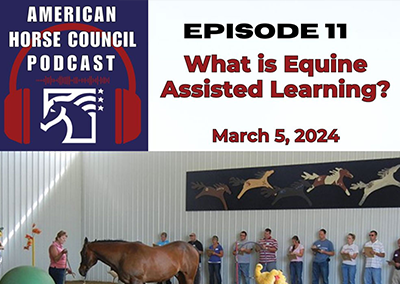
by gabbydondero25 | Mar 5, 2024 | Horses, Podcasts
Shownotes Julie and Megan step into the transformative world of equine-assisted learning. In this episode, we delve into what equine-assisted learning is all about, and how it can profoundly impact personal growth and development. Join us as we uncover the unique bond...

by gabbydondero25 | Mar 1, 2024 | News
BACK Deadline extended! The American Horse Council (AHC) is looking to honor the brightest leaders in the equine industry. The nomination period for the prestigious awards is now open. Honorees will be named during the AHC’s annual meeting and National Issues Forum,...




